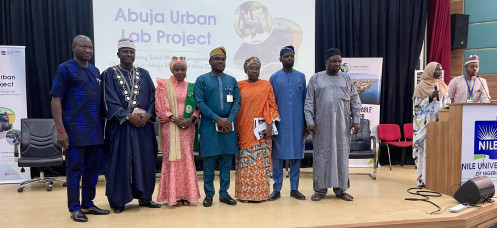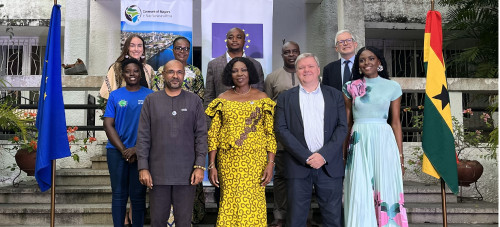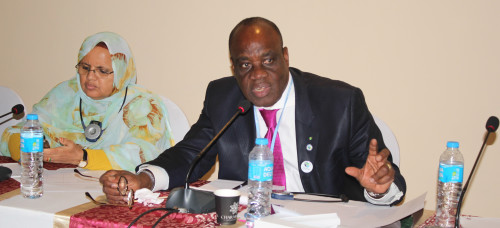Exploring the critical partnership between youth and cities to accelerate climate action
Published: 2 Mar 2022

During a youth-focused session at Africa-Europe Week, African mayors and youth-led civil society organisations (CSOs) engaged in a candid conversation about how they can join forces to take action against the climate crisis.
Africa-Europe Week (14 -18 February) saw people from across the European Union and Africa come together to discuss the strategic priorities and future perspectives of a more robust and people-centred Africa-EU partnership, which will bring added value and concrete benefits for all.
As part of this week-long event, the Global Covenant of Mayors for Climate and Energy (GCoM) secretariat, the Covenant of Mayors in Sub-Saharan Africa (CoM SSA) secretariat, with the support of the Covenant of Mayors for the Mediterranean (CoM Med/Clima Med) hosted a session entitled, “Youth and Cities vs Climate Change: How cities, local organisations and youth can team up to fight climate change”. The event, which gathered more than 135 participants, focused on developing partnerships between local governments in Africa and local, youth-led CSOs to combat climate change and advance the clean energy transition. It was moderated with great enthusiasm and success by Ms Pato Kelesitse, host of the Sustain267 podcast.
Director: Just Transition - Consumers Energy Efficiency and Innovation at the European Commission, Paula Pinho, highlighted the role of youth at COP26, where younger delegates called for faster, deeper change to fight against climate change and safeguard the planet. She said, “youth have the energy and readiness to change behaviours - an energy that is crucial to adapt to and mitigate climate change effects.”
Strong partnerships between local governments and CSOs can greatly improve the success and ultimate longer-term sustainability of projects in African cities and regions.
Director: Green Deal, Digital Agenda at the European Commission, Carla Montesi, described the youth as agents of change, saying, “the youth are our partners for the green transition and can boost the work of municipalities.”
Local governments are committed to partnering with the youth to harness their passion to build a more resilient world. During the event, African leaders shared the different ways they are involving the youth in their local government.
The Lord Mayor of Dodoma, Prof Davis Mwamfupe, explained one of the initiatives in his city: “We have a programme to encourage the youth to get involved in our tree planting campaigns. We also have a campaign that mandates the planting of trees when applying for a building permit.” At the same time he says that “we need to give more voice to the youth and more space for decisions.”
Through CoM SSA, signatories create Sustainable Energy Access and Climate Action Plans (SEACAPs) to outline the targets and actions needed for sustainable and low emission development. The SEACAP process provides an opportunity for signatories to collaborate with youth-led CSOs on projects to reach these targets.
CoM SSA signatory, Mayor of Bangui, Emile-Gros-Raymond Nakombo, explained his journey with CoM SSA: “ Our city was the first to have its SEACAP recognised and validated by the government and the Covenant. We made sure to support youth initiatives, especially involving them in reforestation, as we are in a forest country.”
Although both local governments and CSOs agree that working together is one of the best ways to take concrete climate action, there are still some challenges to this collaboration.
Mr Olumide Idowu, Executive Director of the African Youth Initiative on Climate Change in Lagos, explained some of the challenges facing his CSO, “one of the key challenges that we keep seeing is the issue of transparency and accountability when engaging local governments in our work. Community resource mobilisation is another issue we are facing.”
There are also various other hurdles that CSOs encounter when trying to partner with governments and other institutions, many related to bureaucratic processes.
Mr Anis Jegham, the newly elected Mayor of Hammam-Sousse, in Tunisia, explained his approach, “the administration is taking a participatory approach that includes young people from civil society. We need their technical input and motivation.”
As a new local administration, it is essential to ensure continuity of the relationship with CSO's and its activists to maintain the successes and continue to build on the work of the past administration.
Environment and Climate Activist in Ghana, Ms Ellen Lindsey Awuku, described one of the methods being used to better facilitate this collaboration: “we have a CSO platform on SDGs which offers us an opportunity to interact with politicians from time to time. This helps us to get more engagement on projects and ideas.”
CSOs and governments are trying different methods to improve this necessary partnership.
Director of the Organisation for Environment and Sustainable Development in Togo, Mr Joseph Kogbe, outlined another method: “The implementation of a formal partnership framework between local governments and NGOs facilitates collaboration.”
Another important actor to consider in these collaborations is the “informal sector” of which many are referred to as the “voiceless”. It is important for this sector to be included in the decision-making process to make way for inclusive, effective and sustainable climate actions.
Founder and Executive Director at One World International in Malawi, Mr Stephen Chiunjira, explained, “There is a disjuncture between the informal and formal sector, where the formal sector imposes decisions on the informal sector. OWI has benefited a lot by including the informal sector in our efforts, which we bring to the local governments.”
While the two parties may not always be able to collaborate on projects, both local governments and CSOs are committed to taking action on the ground.
Adnane Ghazi, Head of the Planning and Sustainable Development Department in Oujda Municipality, Morocco, gave a brief presentation on the city’s approach. He explained how it enables local civil society members, youth, and cultural associations to get involved at different levels through consultations in total equity between women and men. Ms Cécile Gillot (in charge of the cooperation between Oujda and Lille in France on managing sustainable energy projects, culture and youth mobility) and Mourad Arabi (president of Yes Green l’Association) accompanied him to talk about the North-South cooperation programme with Lille.
A representative from the Lake Victoria Region Local Authorities Cooperation’s (LVRLAC) Uganda chapter in Entebbe, Mr Mercy Sebuliba, elaborated on initiatives this organisation is implementing: “We have started putting climate change competitions in schools, whereby councils such as Jinja and Entebbe compete with one another in tree planting, waste management and other sectors.”
All the Mayors agreed that tree planting initiatives were popular in their local governments, with some encouraging people to plant trees on birthdays.
CoM SSA signatory, Mayor of Lusaka, Ms Chilando Chitangala, described the green schools initiative her team is implementing, “We go into schools and do a lot of climate sensitisation exercises.” Mayor Chitangala also stresses the importance of partnerships, “we want to partner so that we can strengthen ourselves because to succeed in some of our campaigns we need a lot of financial and human support.”
Mayors and representatives from CSOs were enthusiastic and energetic in their involvement, which saw the session ending off with a fun set of rapid-fire questions on burning issues. The interventions shared during the event showed that although there are challenges to developing partnerships between local governments and CSOs, both parties are committed to building more resilient cities.
In the lead-up to COP27, there is a hope that we will see African cities lead the way by encouraging the voices of youth to be heard and for governments to leverage the role they can play in accelerating climate action at the local level.
View the full English and French recording here.
A special word of appreciation is due to the funders of this event: The European Commission, Bloomberg Philanthropies, the German Federal Ministry of Economic Cooperation and Development (BMZ) and the Spanish Agency for International Development Cooperation (AECID).





